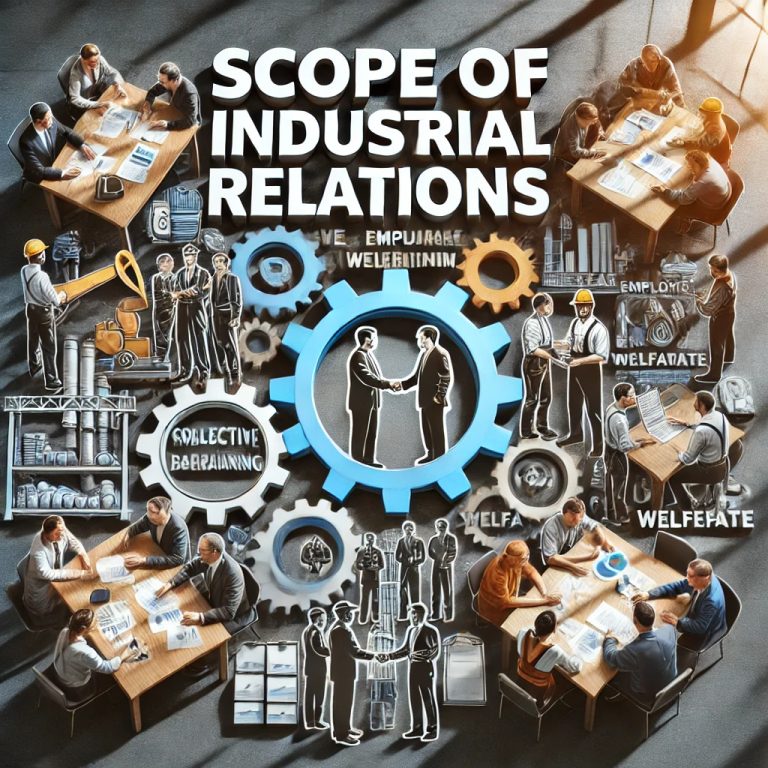The scope of industrial relations encompasses the broad dynamic framework governing relationships among employers, employees, and government within the industrial setting. Industrial relations (IR) broadly encompass the legal, economic, and social interplay within work environments, with the ultimate objective of a harmonious and productive relationship between labor and management. A sound industrial relations environment ensures organizational growth, employee satisfaction, and overall industrial peace-an essential recipe for economic development.
Industrial Relation Meaning
Industrial relations refer to the interactions between employees, usually represented by a union, and employers who are governed by labor laws and collective agreements; they are controlled by social, economic, and political influences. The act of government plays an important role in industrial relations as it ensures the production of policies that would help to bring about balance in work. Effective industrial relations enhance the productivity levels in the workplace, reduce the occurrence of conflicts at the workplace, and ensure the general well-being of both the workforce and the organization.
- Labor Management Relations: This involves negotiations between employers and employees regarding wages, working conditions, and other employment terms.
- Trade Unions: They play a critical role in representing employees in industrial relations by negotiating collective bargaining agreements and ensuring workers’ rights are protected.
- Government Intervention: The government sets labor policies, regulations, and legislation to ensure fair treatment and the resolution of disputes.
Characteristics of Industrial Relations
The attributes of industrial relations depict its multi-level nature since it involves and interplays with different stakeholders in the system, such as managerial entities, labor unions, and government agencies. With every attribute, one gets facets about how industrial relations function in different systems of organizations. The attributes reveal the manner in which industrial relations influence not only the internal activities of the organizations but also the economic and social context as a whole.
- Multi-Dimensional: Industrial relations span economic, social, and political aspects. This means that workplace issues are not limited to wages or job security but can also involve broader social and political dynamics.
- Collective in Nature: IR primarily deals with collective relationships rather than individual ones. Collective bargaining and negotiations between unions and employers are common features of industrial relations.
- Conflict and Cooperation: Conflict is inherent in industrial relations, particularly when employees’ demands differ from what the management offers. However, the aim of IR is to transform this conflict into cooperation through dialogue and negotiation.
- Dynamic and Evolving: Industrial relations are constantly evolving due to changes in labor laws, societal expectations, globalization, and technological advancements.
- Government Involvement: Governments play a crucial role in setting labor standards and resolving industrial disputes through mediation or legal frameworks like labor courts.
Objectives of Industrial Relations
The result of industrial relations is to produce a balanced and fair relationship between the employer and the employee, thereby reducing conflicts to the lowest level and enhancing productivity to the fullest level. These outcomes further give the ability to contribute to the sustainability and prosperity of the business environment.
- Promote Industrial Peace: The foremost objective of IR is to maintain harmony in the workplace, ensuring that disputes are resolved peacefully without disruptions to production.
- Enhance Productivity: By fostering a cooperative work environment, IR aims to increase productivity. This includes encouraging collaboration, effective communication, and alignment of goals between management and employees.
- Protect Worker Rights: IR ensures that employees’ rights, such as fair wages, safe working conditions, and the right to collective bargaining, are respected and protected under the law.
- Economic Development: Good industrial relations contribute to the overall economic development of a country by ensuring the smooth functioning of industries, which in turn boosts national productivity and economic growth.
- Improve Workplace Conditions: An important goal of IR is to continually enhance workplace conditions, ensuring employee satisfaction, safety, and welfare.
Nature of Industrial Relations
There is a cooperative and a conflicting nature in industrial relations. The relationship of employers and employees may be dynamic, changing with the conditions provided within the organization, industry, or economy. Important Nature about the Aspects of Industrial Relations:
- Interdependence: Industrial relations are based on the mutual dependence of employers and employees. While employers need labor to run their operations, employees depend on the organization for their livelihood.
- Regulated by Law: The nature of IR is largely shaped by labor laws and regulations. Governments set up various labor policies to ensure that workers are treated fairly, while employers have their rights protected as well.
- Continuous Process: Industrial relations are ongoing and must be continuously managed. As economic conditions and workplace dynamics change, IR must adapt to new challenges and opportunities.
- Multi-Faceted: IR encompasses a variety of factors, including economic, social, and psychological dimensions. The motivations and behaviors of both employers and employees influence the nature of their interactions.
Scope of Industrial Relations
Industrial relation scope is vast and covers several areas that affect interaction in employment, the government, and organizations. It far extends simple wage negotiations and encompasses many issues concerning the welfare of work and the general well-being of organizations. Scope Areas of Industrial Relations:
- Employee Relations: This involves managing the day-to-day interactions between employees and management. It includes resolving grievances, negotiating collective bargaining agreements, and addressing workers’ needs.
- Conflict Resolution: The scope of IR includes mechanisms for resolving conflicts between employers and employees. This could involve mediation, arbitration, or labor courts.
- Labor Laws and Regulations: Industrial relations deal with the implementation and enforcement of labor laws, including minimum wage laws, working conditions, and occupational safety standards.
- Collective Bargaining: An important part of the scope of industrial relations is the negotiation of wages, benefits, and working conditions through collective bargaining agreements between employers and unions.
- Training and Development: Improving employee skills through training and development programs is another critical area within the scope of IR, helping to ensure that workers are up to date with industry standards and trends.
- Industrial Democracy: IR encompasses the concept of industrial democracy, where workers are given a voice in the decision-making processes that affect them.
By covering these areas, industrial relations contribute to creating a balanced and equitable workplace where the interests of both employers and employees are addressed.
Conclusion
Scope of industrial relations is wide and has deep roots in maintaining harmony and productivity at work. Industrial relations act as a balance between the interests of employers, employees, and the government through combinations of law frameworks, collective bargaining, and effective communication. It plays a significant role in the growth of organizations and the economy, both grounded on a productive and peaceful working environment. Knowing its characteristics and objectives as well as the nature of business that can be done, a business entity ensures smooth-running operations and satisfaction among employees.
Scope of Industrial Relations FAQs
What is industrial relations?
Industrial relations refer to the relationship between employers, employees, and the government in an industrial setting, focusing on resolving workplace issues.
What are the objectives of industrial relations?
The primary objectives are to promote industrial peace, protect workers’ rights, enhance productivity, and foster economic development.
What is the nature of industrial relations?
Industrial relations are cooperative yet prone to conflict, and they are shaped by interdependence, legal regulations, and continuous management.
What is the scope of industrial relations?
The scope includes employee relations, labor laws, conflict resolution, collective bargaining, and industrial democracy.
How do industrial relations affect productivity?
Good industrial relations lead to a cooperative work environment, reducing disputes and enhancing overall productivity within the organization.


